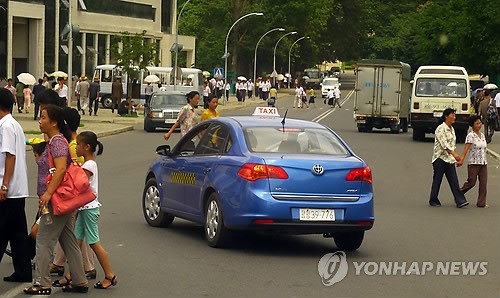Chinese carmakers, in the absence of Hyundai and other South Korean players, are betting big on the seemingly emerging North Korean automotive market.
And leading the group is BYD, a Chinese manufacturer of autos and batteries, which is 10 percent owned by Warren Buffett.
According to news reports on Sunday, Pyongyang recently purchased 60 F3 taxis from BYD. The Shenzhen-based company now reportedly operates 300 taxis out of the total 1,000 in the capital city.

A taxi drives in downtown Pyongyang in this undated file photo. (Yonhap News)
“These cars are present everywhere nowadays, and very visible thanks to their transparent and even aggressive colors,” a source in Pyongyang told NK News, a Washington-headquartered news site.
The source added the cabs, called “Beijing taxis” due to their distinctive yellow and green body colors, emerged on the streets of Pyongyang in May.
The news came as Chinese companies are ramping up efforts to expand their presence in North Korea. Of the 226 companies from 12 countries that participated in a recent global product fair in Pyongyang, 118 came from China.
Especially in some Chinese cities that border North Korea such as Dandong, a growing number of carmakers and their suppliers are setting up their operations, sources said, possibly to take an early edge in the market.
“It’s been four to five years since we started selling BYD cars in North Korea,” a BYD dealer was quoted as saying by Chosun Shinbo, a paper published by the General Association of Korean Residents in Japan, or Chochongryon.
“Our sales are higher than before. I feel car demand is growing among Pyongyang citizens,” said the man, adding that his dealership sells seven passenger vehicle and minivan models and operates a service center in the city.
Industry watchers, though, were cautious about saying that the auto market in North was really growing, considering owning a car or a ride on a taxi are still considered a luxury allowed to only a fraction of the upper class there.
By Lee Ji-yoon (jylee@heraldcorp.com)





![[KH Explains] No more 'Michael' at Kakao Games](http://res.heraldm.com/phpwas/restmb_idxmake.php?idx=645&simg=/content/image/2024/04/28/20240428050183_0.jpg&u=20240428180321)
